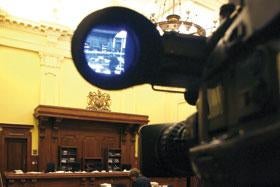
Prime Minister David Cameron is backing calls for television cameras to be allowed inside court rooms to film certain elements of criminal proceedings, according to Sky News.
The Government is already seriously considering proposals put forward by broadcasters that would permit filming from courts in tightly controlled circumstances.
But it was claimed that Cameron will give his backing for “limited” coverage of certain trials that will see the sentencing remarks of judges televised, rather than the entirety of criminal proceedings.
According to Sky News, which has been campaigning for cameras in court, the Prime Minister will make the comments when he appears in Parliament later today.
Broadcasters have been pressing for a law change for a number of years, but cameras are currently banned from all courts in England and Wales.
The only exception is the Supreme Court where cameras have been allowed to film proceedings for the past two years.
A spokesman for Number 10 said: “We are considering proposals put forward by broadcasters to allow limited recording and transmission from courts in specific circumstances.
“However, before any firm proposals are developed, the Lord Chancellor will wish to consult on the principle of broadcasting from court with the senior judiciary.”
John Ryley, head of Sky News, has written an open letter to Justice Secretary Ken Clarke calling for proceedings to be televised.
In January 2010 he announced a campaign to get television into the courts, which he said would include legal challenges to the current ban on cameras in court.
In the letter he said it was time TV cameras were allowed into courts, starting with the televising of sentencing remarks and judgments.
He added that the public would have better understood controversial sentences passed on those convicted after the riots if judges’ remarks had been televised.
Responding to Cameron’s reported support of the measures, he said: “Sky News welcomes the decision and looks forward to working with the judiciary to bring about more transparency in our justice system.”
Media lawyer Mark Stephens said the move should be welcomed.
“There is often ill-informed comment about why particular individuals have received the sentences that they have,” he said.
“When you hear the judge giving their remarks explaining what the tariff for a particular crime is, then in those circumstances the public would have a much clearer understanding of sentences.
“Since the Supreme Court has been in place there has been television cameras in there and there has been no difficulties for two years.”
Stephens added that he did not believe a “single senior member” of the judiciary was opposed to the introduction of cameras, and said the main benefit would be to promote “open and transparent justice”.
He added: “Our European near-neighbours and many Commonwealth countries allow cameras into their courtrooms.
“As a result the judges in this country have seen that the problems that were perceived as possible haven’t emerged in practice, so it’s safe for cameras to be introduced in this very limited way.”
However, the proposals have raised concerns about the safety of witnesses and jurors.
Shadow justice secretary Sadiq Khan said: “I believe that public understanding of, and confidence in, our legal system would improve if judges’ verdicts were televised.
“However, it will be extremely important to ensure that careful controls are in place to protect jurors, victims and witnesses, particularly in complex and high-profile cases.”
Peter Lodder QC, chairman of the Bar Council, said the legal establishment was not “hostile” to the idea, but that justice would be impeded if televising court cases prevented witnesses from giving evidence.
He told Sky News: “There are a number of agencies who have worried about the effect upon witnesses – police themselves, and those who supply support for witnesses.
“They are very conscious of the fact that giving evidence is a potentially very stressful experience and therefore we must be very careful to make sure that those witnesses are not intimidated by cameras.
“We want transparency but we also want justice. And if, in fact, a development like this prevents people from coming forward to give evidence in court, then we don’t get justice.”
Earlier this year Director of Public Prosecutions Keir Starmer QC revealed he was in favour of the idea, saying it would allow the public to “see justice”.
A consortium of broadcasters was allowed to film appellate courts and prepare dummy programmes in an experimental run in 2004-2005.
The then Lord Chancellor, Lord Falconer, was said in November 2006 to be in favour of allowing cameras to film both criminal and civil trials.
The televising of court proceedings is opposed by Tory MP Roger Gale who said it risked turning justice into a reality show and providing a platform for “eccentric” legal professionals.
Gale, a former TV producer, said screening Parliament had resulted in grandstanding by MPs and a concentration on “juicy” extracts at the expense of less entertaining debates.
“I believe that the televising of the closing speeches in law courts and the passing of sentences will create the same effect as thrusting barristers seek to impress the media with fee-improving performances and the more eccentric members of the judiciary use the TV platform to address the nation,” he said.
“The courts are supposed to be a place where justice is done and where it is, by those actually present and listening to the evidence, seen to be done. That must not be allowed to change.
“This is not about transparency or democracy, it is about television showbusiness and we do not need our law courts to be turned into yet another ‘reality’ TV show.”
Email pged@pressgazette.co.uk to point out mistakes, provide story tips or send in a letter for publication on our "Letters Page" blog
